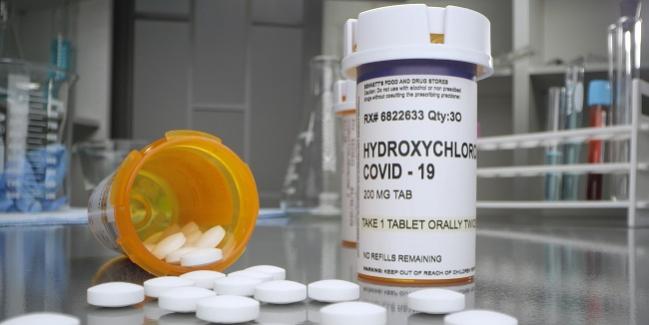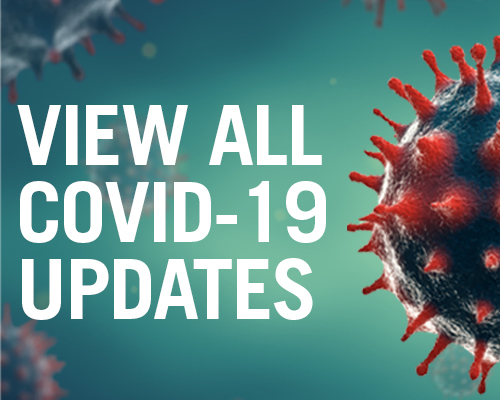Hydroxychloroquine: No Help, Clear Harm in COVID-19 RCT and Cohort Studies
President Trump says he’s taking it daily, but three new studies and an ACP warning say hydroxychloroquine is of little benefit.

The President of the United States says that he is taking daily hydroxychloroquine (HCL) as prophylaxis against COVID-19 despite mounting evidence that the drug is not useful and causes harm. Donald Trump’s widely reported announcement comes within days of the American College of Physicians (ACP) warning people not to use chloroquine or HCL either alone or in combination with azithromycin (AZI) for prevention or treatment of COVID-19 outside of a research setting, as well as the publication of a small, randomized clinical trial and two peer-reviewed observational studies showing no benefit, all from different parts of the world.
Of note, the larger of the two observational studies—from New York City—reported that the risk of sudden cardiac arrest was doubled in patients taking the HCL/AZI combination.

“The current evidence is conflicting and of low quality about the efficacy of using chloroquine or hydroxychloroquine alone or in combination with azithromycin to prevent COVID-19 after infection with SARS-CoV2, or to treat patients with COVID-19,” Amir Qaseem, MD, PhD (Thomas Jefferson University, Philadelphia, PA), ACP’s vice president for clinical policy, told TCTMD in an email. The ACP’s “living practice points” on HCL with or without AZI were published May 13, 2020, in the Annals of Internal Medicine.
“Based on best available evidence, there are known harms and no available evidence of benefits,” Qaseem continued. “Clinicians may treat hospitalized patients in the context of a clinical trial but need to first use informed and shared decision-making with patients (and their families) to explain the known harms and very uncertain evidence of benefit.”
In late March, the US Food and Drug Administration issued an emergency use authorization (EUA) for hydroxychloroquine sulfate and chloroquine phosphate but less than 4 weeks later issued a drug safety communication stating that hydroxychloroquine had not yet been shown to be safe and effective for treating or preventing COVID-19, and also stressed that use should be limited to clinical trials. A viewpoint in JAMA Internal Medicine May 19, 2020, charges the FDA with failing to transparently document the scientific evidence the agency used before issuing its EUA.
Evidence Builds Against HCL in COVID-19
In-vitro studies, coupled with anecdotal reports and observational series out of China and Europe, first buoyed hopes that these agents might target SARS-CoV-2. China is now the source of the first randomized controlled trials in this space to be published in a peer reviewed journal and the results fall short.
As Wei Tang, MD (Shanghai Jiao Tong University, China), and colleagues write in the BMJ May 14, 2020, patients with mild-to-moderate COVID-19 symptoms were randomized to placebo or to 1,200 mg daily of HCL for 3 days, followed by a maintenance dose of 800 mg for 2 to 3 weeks depending on disease severity. Negative conversion of SARS-CoV-2 within 28 days—the trial’s primary endpoint—was similar between groups: 85.4% in the active treatment group and 81.3% in the standard-care group, a nonsignificant difference. Improvement in clinical symptoms was also no different between groups.
Based on best available evidence, there are known harms and no available evidence of benefits. Amir Qaseem
Also published in the BMJ last week was an observational study out of France led by Matthieu Mahévas, MD, PhD (Henri-Mondor Hospital, Paris-Est Créteil, France), and focused on hospitalized patients requiring oxygen. Here, a comparison of outcomes among patients who’d been treated with 600 mg of daily HCL versus standard care showed no significant differences in survival at day 21 (89% vs 91%), survival without acute respiratory distress syndrome at day 21 (69% vs 74%), or being weaned from oxygen (82% vs 76%). Notably, one in 10 patients in the HCL group discontinued treatment due to heart rhythm disturbance documented on ECG, including seven patients with QT interval prolongation and one with first-degree atrioventricular block—that rate is consistent with a systematic review published in Heart Rhythm May 10, 2020, which found that 10% of COVID-19 patients treated with chloroquine or hydroxychloroquine developed QT prolongation.
“Hydroxychloroquine has received worldwide attention as a potential treatment for COVID-19 because of positive results from small studies,” Mahévas et al conclude. “However, the results of this study do not support its use in patients admitted to hospital with COVID-19 who require oxygen.”
Finally, from the New York metropolitan region, investigators writing in JAMA May 11, 2020, retrospectively reviewed any link between HCL with or without AZI among 1,438 hospitalized patients at 25 area hospitals. Eli S. Rosenberg, PhD (University at Albany School of Public Health, Rensselaer, NY), and colleagues report that overall mortality was 20.3% for hospitalized patients. Broken down by medication use, the probability of mortality was 25.7% in patients given HCL plus AZI, 19.9% for patients taking HCL alone, 10% for patients given AZI alone, and 12.7% for patients treated with neither drug. Compared with patients taking neither medication, the risk of cardiac arrest was significantly more likely in patients receiving HCL plus AZI (adjusted OR 2.13; 95% CI 1.12-4.05) but not hydroxychloroquine or azithromycin alone.
Three Waves Swamp the Shores
Commenting on the three papers for TCTMD, Timothy F. Simpson, MD, PharmD (Oregon Health & Science University, Portland), stressed that, to date, the pace of evidence generation relating to COVID-19 has not been matched by quality, adding that there have been “three waves of evidence” so far.
The first, he argued, was an outpouring of low-quality, uncontrolled, observational studies based solely on what drugs were tried and what happened to patients. It was these, he said, that first raised hopes that chloroquine or HCL, plus or minus azithromycin, might alter the course of this disease. The second wave involved “similarly mediocre-quality observational trials, still nonrandomized, but using some kind of control group.”
One of the “second wave” trials was the small, single-center French study showing that HCL significantly reduced viral load and clearance when compared with untreated patients from another center or patients who refused the drug. “The US President tweeted about that study, and that drove a lot of hype and expectations that haven’t really been reproduced even in these other poor-quality studies,” Simpson said.
The third wave of evidence, he continued, is “really just getting started” and includes “reasonable-quality, randomized data that’s actually been peer reviewed,” such as the Tang paper in BMJ. But here, too, “it’s small, just 150 patients, it's of moderate quality, there are a lot of methodological issues with this study as well, and it wasn't powered to look at [hard endpoints like] did people die? Did they go to the ICU? Did they get intubated? It wasn't powered to evaluate those.”
More evidence is on the way, with more than 150 ongoing studies listed in US and European clinical trial registries that will help guide decision-making in the weeks and months to come, he noted. “This third wave will obviously be the most informative, but we're obviously very early on in it and the evidence that's out there—nothing points to this being a great therapy for patients. People's expectations have been wildly dampened over the last month or two, so across the board usage has decreased. Certainly the physicians that are following this are a little more realistic in their expectations.”
I think in retrospect we'll find that there was certainly harm done by widespread use of this drug. Timothy Simpson
Simpson predicts that an uptick in arrhythmias, and perhaps even fatal arrhythmias, may be one legacy of the wide use and promotion of these drugs before adequate evidence was in. He points to the signal of increased cardiac arrest seen in the New York cohort, a pattern also documented in a number of other uncontrolled series. “I think the data on efficacy are much blurrier, but on the harm side I think we’re seeing a very real signal that this drug in this population, specifically the hospitalized population, is not without risk,” Simpson said. “I think in retrospect we'll find that there was certainly harm done by widespread use of this drug.”
Asked what he would say to President Trump if he had the opportunity to advise him on hydroxychloroquine, given the spate of studies published over the last week, Simpson said: “I upfront would recommend against this therapy at this time. It’s really a balance of the potential benefit and the potential risk. And at this point, there is no clear proven benefit and there are very clear indicators of risk. My interpretation of that is that this is unlikely to be of net benefit to him or any other patient population at this point.”
Simpson added that it will be important to do high-quality studies in order to get a definitive answer. He doesn’t personally know any physicians who are self-prescribing hydroxychloroquine (which was widely reported in the early days of the COVID-19 pandemic) although he does know some who are taking it as part of the large healthcare professionals WHIP-COVID-19 prophylaxis trial. Members of the public who feel strongly about taking this drug also have this option, he noted, provided they fully understand the shortcomings of the data to date.
“Using these drugs in the context of a clinical trial is critically important and that doesn't mean that these drugs should never be used, but they shouldn't be used in the way that President Trump and others are using them, which is people [just] taking them to see what happens,” Simpson stressed. “If people, on the basis of their personal decision, really want to be on one of these medicines they should really seek out a clinical trial to be involved in, whether they have the disease or whether it's prophylaxis, because that's really the only way we're going to figure this out.”
Shelley Wood was the Editor-in-Chief of TCTMD and the Editorial Director at the Cardiovascular Research Foundation (CRF) from October 2015…
Read Full BioSources
Mahévas M, Tran V-T, Roumier M, et al. Clinical efficacy of hydroxychloroquine in patients with COVID-19 pneumonia who require oxygen: observational comparative study using routine care data. BMJ. 2020;369:m1844.
Tang W, Cao Z, Han M, et al. Hydroxychloroquine in patients with mainly mild to moderate Coronavirus Disease 2019: open label, randomised controlled trial. BMJ. 2020;369:m1849.
Rosenberg ES, Dufort EM, M Udo T, et al. Treatment with hydroxychloroquine or azithromycin and in-hospital mortality in patients with COVID-19. JAMA.. 2020;Epub ahead of print.
Disclosures
- All study authors as well as Qaseem and Simpson declare no relevant conflicts of interest.


Anne Clayton MD